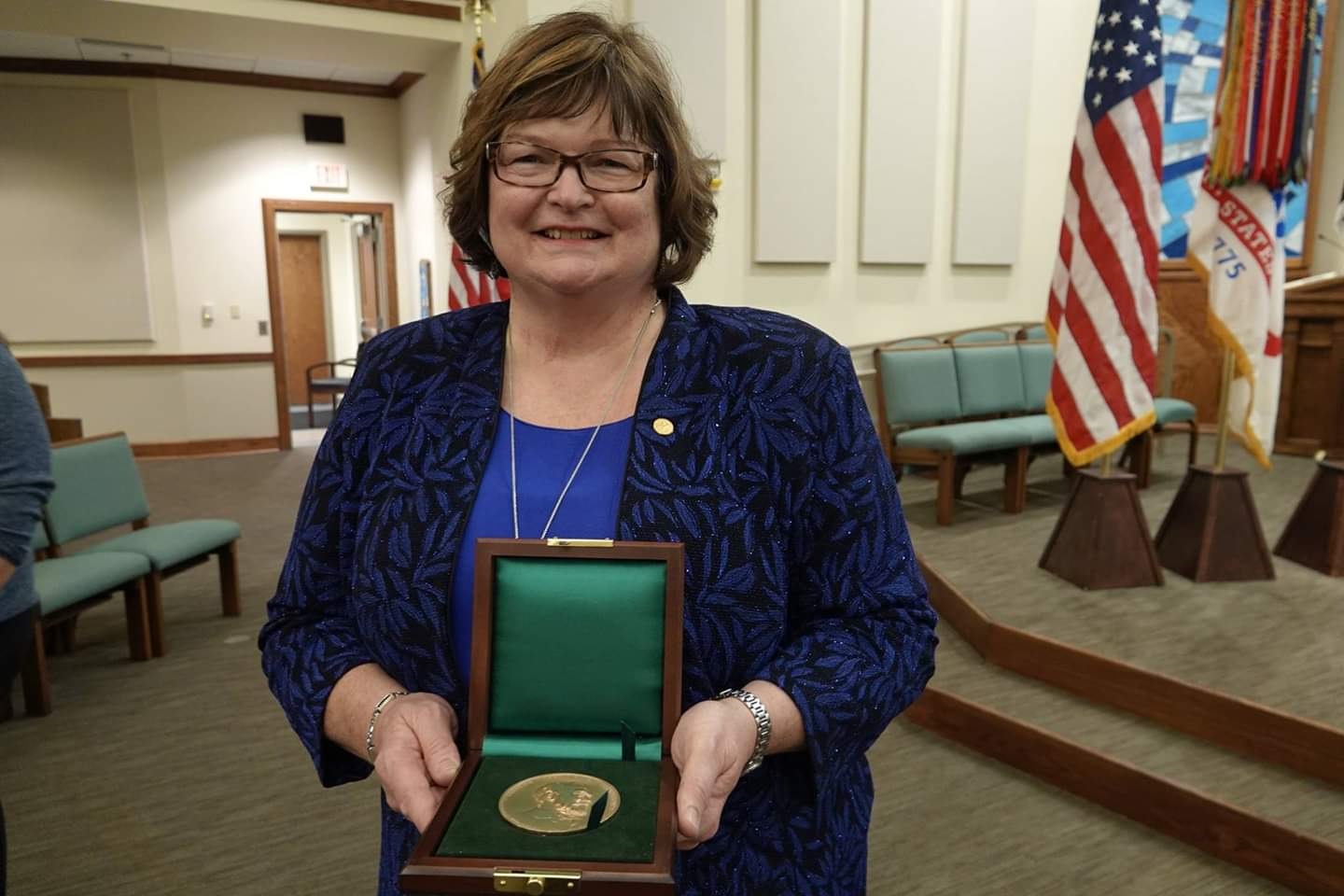
It took about 109 years to fully recognize, but heroism runs in Deanne M. Kilian’s family.
Kilian, now 64, a pediatric nurse practitioner at Munson Army Health Center in Fort Leavenworth, Kan., received her Carnegie Hero medal in a ceremony Oct. 26 for rescuing a nurse who was attacked by a disgruntled civilian employee.
That man is serving 20 years in prison for dousing the nurse, then-First Lt. Katie Blanchard, with gasoline and setting her afire before also attacking her with scissors and a razor in September 2016.
The first time Kilian realized she was nominated for a Carnegie Hero medal is when the FBI agent investigating the attack mentioned it.

Immediately, Kilian remembered that her grandfather, William F. Bayless, a farmer from the Dodge City area in Kansas, had won the medal in 1909, five years after industrialist and philanthropist Andrew Carnegie created the Carnegie Hero Fund Commission.
“Wow, wouldn’t it be neat if I got one, too?” Kilian said of her first thought upon learning she’d been nominated.
Her grandfather’s medal was awarded after Bayless, then just 23, allowed himself to be lowered into a 45-foot well to save a fellow farmer who was overcome by gas fumes.
By the time Bayless arrived at the scene, Clarence M. Thompson had arrived and initiated a rescue attempt, sliding down a rope and tying it to two other farmers that had collapsed at the well’s bottom.
Those two men were raised up, but by the time the rope was lowered down to Thompson, he had lost consciousness.
After being lowered down, Bayless untied the rope from his body and fastened it to Thompson who was hoisted to safety and revived.
The rope was lowered again and Bayless was drawn up, weak and dazed.

Family lore has it that Bayless made the rescue despite a case of whooping cough, and that word of his heroic deed may have played a part in wooing a bride: Bayless was married less than a year later and went on to father eight children before he retired and, eventually, died in 1962.
Bayless’s medal “was a really wonderful honor and if I could be honored in this way for doing this, it would be very, very meaningful to me,” Kilian said.
“When you stop and think of what you did just because you knew it was the thing to do and you were in the right place at the right time and that with God’s help I was able to do those things,” Kilian said, “To make a difference in someone’s life, it’s really humbling.”
Blanchard, since promoted to captain, has been transferred to Joint Base Lewis-McChord near Tacoma, Washington, as part of the Army’s Wounded Warrior Battalion.
Though not wounded in combat, Blanchard, a 29-year-old married mother of three boys (Arthur, 8; Finn, 4; and Canaan, 2) is participating in the same vocational and rehabilitative programs designed to help combat veterans overcome their injuries so they can live and work normally again.
“I feel like I’m doing well considering the circumstances and how it could have ended up,” Blanchard said.
Blanchard, who expected to be discharged from active duty in December, is hoping to work as a nurse again in the private sector.
Blanchard flew to Kilian’s medal presentation ceremony. She said she “found it really touching that she was honored in that way. It’s one thing to be a hero to one person, but it’s another to be distinguished and to have a community come around you and say, ‘That’s what bravery looks like.’”
Brig. Gen. Jeffrey Johnson, U.S. Army Regional Health Command-Central commanding general, presented the medal to Killian at the Munson Army Health Center.
More than two years earlier, Kilian heard Blanchard’s cries for help and rushed into Blanchard’s nearby office to find her afire from mid-torso up.
Unable to smother the flames with her bare arms, Kilian got a blanket and lab coat with the help of a doctor on the same floor and put out the fire.
Kilian then laid across Blanchard and fended off her attacker as he lunged at and slashed Blanchard who was laying, her clothes still smoky, in the medical clinic’s hallway.
Kilian broke her leg in the effort and suffered burns to her arms and hands; Blanchard lost her right ear and has had more than 60 surgeries and skin grafts to correct other injuries to her face, shoulder, and right arm.
Kilian’s older sister, Marsha Bayless, is the family’s historian of sorts. She had researched their grandfather’s exploits for an imPULSE story marking that award’s 100th anniversary in 2009.
William Bayless’s Carnegie Hero medal was passed down to his daughter Marie, an aunt of Deanne and Marsha. Before Marie died she, in turn, passed on the medal to Marsha and Deanne’s younger brother, Duane.
Having celebrated her grandfather’s Carnegie Hero legacy, Marsha Bayless – chair of the Business Communication and Legal Studies Department at Stephen F. Austin State University in Texas – was “thrilled” to learn her sister also won the medal.
“To think that a person wins it and, 109 years later, the granddaughter wins it, that’s pretty impressive,” Bayless said.
Blanchard said she was happy – but not surprised – to learn of Kilian’s family legacy.
“She was obviously predisposed to be that way and to do things for others,” Blanchard said. “It’s not surprising knowing that she had family members that would do the same thing.”
— Joe Mandak, case investigator

